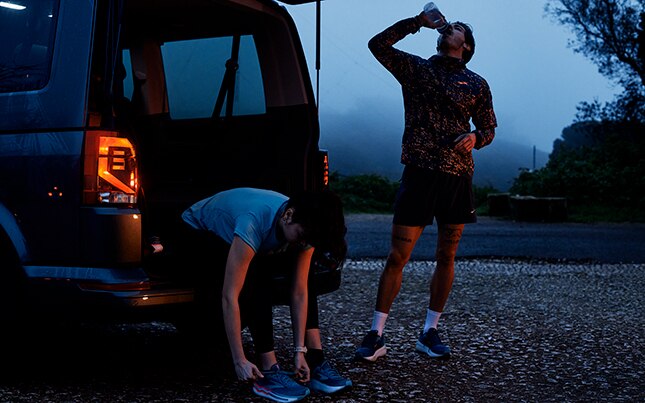Fuel up: what to eat before a race

Properly fuelling your body before a race isn’t just about the foods you eat — you need to think about when and how much you eat, too. Nibble on these nutrition tips to help your body perform at its peak during your next race.

Brooks Beast Team

So, what’s the deal with the pre-race meal?
Your pre-race meal has a couple of things in common with the pair of Brooks shoes you run in.
First, it’s pretty much one-size fits you. “Pre-race meals are highly individual in terms of amount of food and what agrees with a runner”, says Dr. Kyle Pfaffenbach, a professor in the Health and Human Performance programme at Eastern Oregon University and adviser to Brooks Beasts.
Second, you wouldn’t lace up an untested pair of shoes at the starting line of your next race. Why would you risk stomach cramps or other GI stress on race day? Whatever your chosen meal you should break it in during training, especially on more difficult days.
Eating a balanced, nutritious meal before a race is a key part of getting your body to perform, but Dr. Pfaffenbach explains that too often, runners think about this meal as a singular event. Instead, runners should integrate their pre-race meal early in their training and make adjustments leading up to race day. Knowing what to eat before a run will help you learn what to eat before a race.

“The perfect pre-race meal is not the best way to improve as a runner — training hard and consistently is. Despite everyone knowing this, runners rarely eat their pre-race meal before key workouts and training sessions. If you find a pre-race meal that works, utilise it for hard training days, too! This will help you get used to the food and timing, and this approach fuels quality training sessions.”

Key ingredients
Dr. Pfaffenbach knows a thing or two about how food and exercise affect the body. His classes focus on the cellular physiology of exercise, nutrition for health, and nutrition for sport performance. While he can’t prescribe a specific pre-race meal for you, he does have some suggestions:
“For high intensity events, go with low-fibre complex carbs 2–3 hours prior. Examples include pancakes or waffles with some yogurt, fruit and syrup. Other alternatives, such as rice farina (it’s like cream of wheat), can be combined with syrup and granola. For most people, carbohydrates work well for high intensity exercise, but people need to know their individual needs.”
According to Dr. Pfaffenbach, the timing of your pre-race meal is just as important as what’s on your plate. “It can be difficult to eat 2¬–3 hours before a morning race so runners need to experiment with how close to start time they eat and what they can stomach before a race.”
The pre-race plan
When you think about your pre-race meal, remember these four points from Dr. Pfaffenbach:
- Pre-race meals are individual to the runner.
- Eating 2-3 hours before the race works well.
- Timing is everything.
- Test your pre-race meal in training before you get to race day.
Speaking of training
Ready to put Dr. Pfaffenbach’s pre-race meal advice to work? Check out one of our race training plans created by Brooks Beasts coach Danny Mackey:
